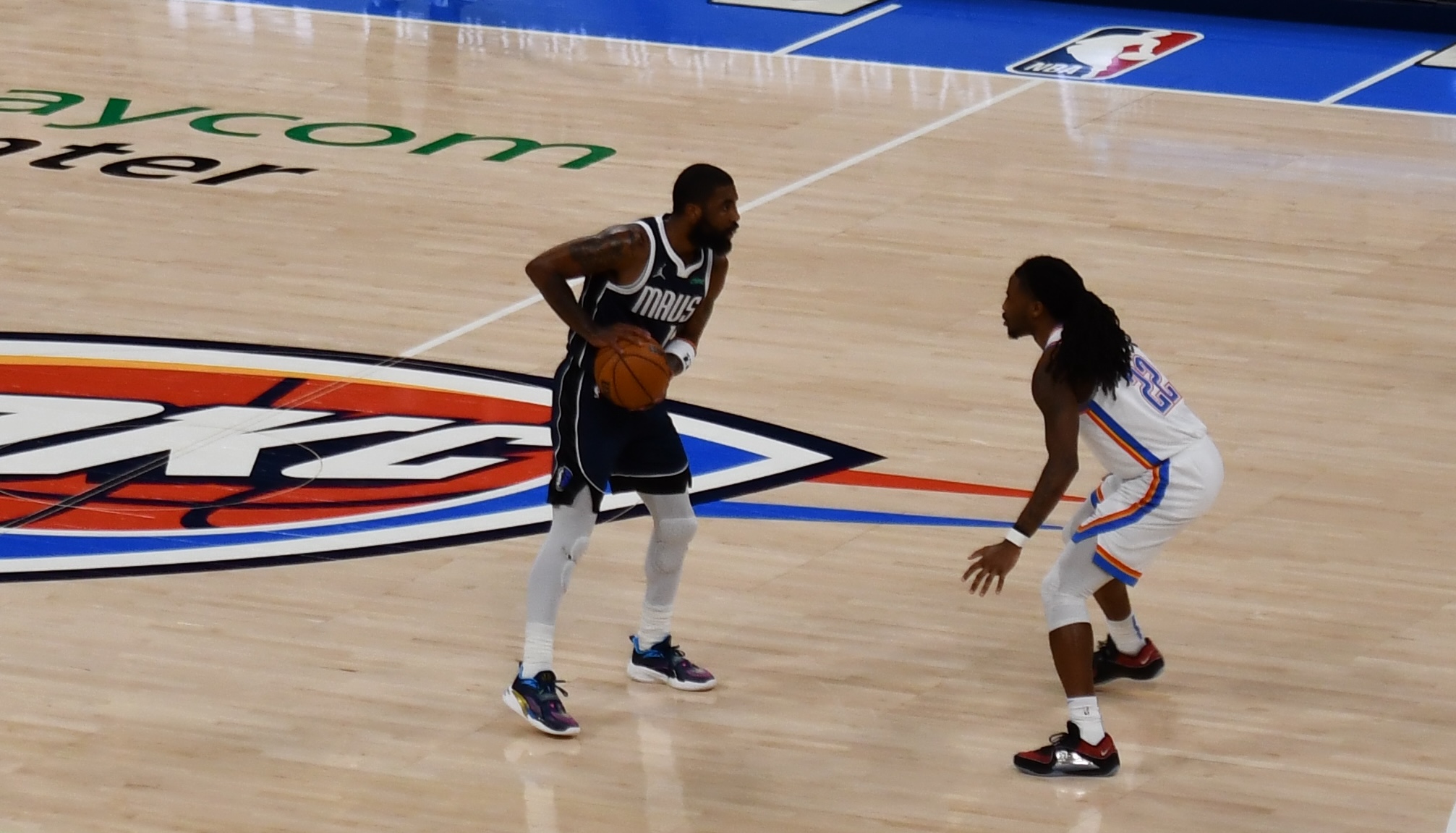Luka-Less Mavs Lose Against Thunder Despite Kyrie Irving's Big Performance
OKLAHOMA CITY — With Luka Doncic sidelined due to left hamstring soreness, the Dallas Mavericks (38-29) took on the Oklahoma City Thunder (46-20) in a road matchup on the second night of a back-to-back. Despite Kyrie Irving's 36 points and 12 assists, the Mavs lost 126-119, ending a four-game winning streak.
“Our leader, Kai, he led us tonight without Luka being out there,” Mavs coach Jason Kidd said. “He set the tone and was really good tonight.”

The Mavs attempted to overcome now having Doncic in the lineup but fell to 3-6 this season when playing without the Slovenian superstar. Not playing without the NBA's leading scorer and someone averaging 34.3 points, 9.8 assists, and 9.0 rebounds, who recently had a stretch of leading the team in points, rebounds, and assists for a historic span of 10 consecutive games, naturally, will lead to challenges.
“There’s not one person who can make up for Luka,” Kidd said before the game. "This is a great test for us. We’ve had injuries before, playing without Luka and Kai. So this gives us another chance for others to step up and do their job.”
In addition to Irving's strong showing, the Mavs received Daniel Gafford made his presence felt inside, totaling 19 points and 15 rebounds. Tim Hardaway Jr. had his shot falling, recording 23 points and nine rebounds. The only double-figure scoring outing for Dallas was Derrick Jones Jr.'s 10 points. However, Jaden Hardy did chip in nine points and five assists off the bench.
"When we were good with the ball, we got to the paint. I thought, again, Hardy was aggressive being able to find guys, Timmy was able to knock down shots," Kidd said. "Again, playing without Luka, we gave ourselves a chance. So everyone in that locker room, um, you know, should be proud of themselves."
A handful of struggling performances for the Mavs, including P.J. Washington, Dereck Lively II, Maxi Kleber, and Dante Exum, scored in single figures and shot a combined 5-24 (20.8 percent) from the floor. Dallas didn't receive enough defensive production from these players to overcome those results on offense. While Irving led a Mavs attack that produced enough offensive results to compete, the team was held back by giving up 34 points off turnovers after turning the ball over 19 times.
“I think the officials did their job tonight,” Kidd said. “Give Oklahoma City credit. They were the better team. We had 19 turnovers for 34 points. You’re not going to beat one of the best teams in the West by turning the ball over, and we have to be better.”
It proved challenging to contain Shai Gilgeous-Alexander, who totaled 31 points, nine rebounds, and five assists. Jalen Williams returned from a one-game injury absence and provided 26 points, five assists, and four rebounds. No matter the defender deployed on either player, Dallas struggled to keep them out of the paint.
“He was himself,” Gilgeous-Alexander said of Williams. “… He did tonight what he’s done all year for us.”
Other double-figure scorers for Oklahoma City included Josh Giddey's 18 points, Luguentz Dort's 12 points, and Chet Holmgren's 11 points. The team shot 16-39 from deep (41.0 percent) amid Dallas' strategy to leave weak shooters open.
Despite the Thunder mixing in some early zone looks, Irving's hot start helped the Mavs to achieve an early 12-11 lead. His second of two made 3-pointers prompted the Thunder to call a timeout with 8:16 left in the first quarter, taking advantage of putting Holmgren in a ball-screening action on both made pull-up jumpers. Dallas continued to play out of pick-and-roll often to create advantages. Despite that, Oklahoma City closed the period strong, outscoring Dallas by a 22-15 margin.
Both teams had a "weak" shooter that was being sagged off of in the half-court to make driving the lane more difficult between Jones and Giddey. As the opening period wore on, both players were used as screeners in double screener actions to open up the floor, with Dallas involving Jones as the back screener in Stack pick-and-roll with Irving as the ball handler. However, Dallas went further and even had a big like Gafford guard Giddey to start some possessions.
One strategy the Mavs deployed was to have a wing guard, Holmgren, neutralize pick-and-roll actions better while the center pre-rotated off of a weaker shooter to serve as the low defender. Lively did this against Dort at times. Doing so ultimately proved problematic for Dallas, which still struggled to protect the paint.
The Mavs tried playing out Zoom action handoffs for Irving, but the Thunder were highly focused on packing the paint, leaving weak-side shooters open. One play stood out when Irving directed his teammates in the half-court to run an empty corner side ball screen, knowing the nail help would focus on him, clearing a stampede drive chance for Josh Green.
With 4:12 left in the first quarter, Green fell to the floor and had difficulty putting weight on his leg. He was assisted off the court and to the locker room. He was later ruled out for the remainder of the game due to a right ankle sprain. He underwent an X-ray after the game, and the results returned negative.
Josh Green’s X-ray was negative. He was ruled out due to a right ankle sprain in the first quarter.
— Grant Afseth (@GrantAfseth) March 15, 2024
The Mavs struggled to contain the Thunder's top perimeter scorers — Gilgeous-Alexander and Williams — often giving up short-range pull-up jumpers and some finishes at the rim. Giddey was able to take advantage early, too. Oklahoma City received 22 points combined from these three players in the opening frame.
The Mavs struggled to generate offensive advantages in the half-court without Irving on the court late in the first quarter. At the end of the period, the Thunder led 33-27.
Irving remained on the bench to start the second quarter, while Dallas picked up its execution. A 13-5 run to open the period, including Gafford finishing an and-one putback, put Dallas up 40-38 in the lead when Irving returned to the court.
The Mavs favored scoring ability by playing Irving, Hardaway, and Hardy alongside each other on the perimeter. A few options were created, including using Irving as a double-drag screener and having Hardaway counter being top-locked in an elevator screening action for a layup. While the initial return was favorable, Oklahoma City took advantage of Dallas' lack of perimeter size, leveraging a 4-0 run to go up 45-44 following Irving's baseline jumper.
While Irving had numerous impressive finishes on drives to help keep the Mavs within striking distance, the Thunder were picking apart Dallas' defense on the other end. Dallas reverted to playing out of empty corner actions, Stack pick-and-roll, and Zoom actions for Irving, who scored 20 points and dished out eight assists through two quarters, keeping the Mavs trailing just 65-63 at the break.
Mavs' Luka Doncic Undergoes 'Clean' MRI, Will Be Re-Evaluated Over Weekend
Oklahoma City punished the Mavs frequently for not getting out on 3-point shooters, which tends to be a problem against a team that leads the NBA in 3-point percentage. The Thunder shot 10-22 (45.5 percent) from beyond the arc in the first half.
After halftime, the Mavs completely left Giddey unguarded on the 3-pointer to pack the paint, but Oklahoma City still managed to lead by as many as 11 points within the frame. Irving remained aggressive in attacking the Mavs, whether to score or use the attention he commanded to create shots for teammates.
The Mavs were more focused on deploying Irving off-ball offensively early in the third quarter, including usage as the back-screener in double-drag Veer action and being the focus of a wide action. Without Doncic, it was necessary to mix things up offensively to prevent the Thunder from loading up too much on Irving.
With Irving and Exum setting the tone offensively, the Mavs narrowed the Thunder's lead to 84-82 at one point, using a made 3-pointer from Exum. Despite their best efforts, the Mavs trailed 95-87 at the end of the third quarter. However, Irving had already recorded 27 points and 11 assists. However, Dallas committed eight turnovers as a team within the period, limiting momentum.
A putback from Gafford reduced the Thunder's lead to 102-99 early in the fourth quarter; the Thunder immediately responded, scoring the game's next seven points before Irving checked back into the game. The Mavs' continued inability to contain lane penetration—with Williams being the attacker—plagued them, with a catch-and-shoot 3-pointer by Holmgren prompting Dallas to call a timeout.
Irving's shotmaking early in the fourth period provided a push. Still, the Mavs were made to pay for leaving weak shooters wide open, with Dort converting from the corner before Gilgeous-Alexander scored in the paint to push Oklahoma City up 116-105 midway through the fourth period. Dallas could not rally back, with the Thunder frequently blitzing Irving to get the ball out of his hands.
The Mavs closed the game with Kleber at the five instead of deploying Gafford or Lively at the five. The intent was to space out offensively, switch on defense, and maximize their ability to guard the perimeter, given they had to account for Gilgeous-Alexander and Williams attacking the paint.
"Being able to switch and try to stay out of the rotations. I thought in the second [quarter] where they made the three or four threes, it puts our bigs in the rotation, and we just were late." Kidd said. "They have two of the best, when you talk about being able to play off the dribble — [Jalen] Williams and [Shai Gilgeous-Alexander]. That's what we looked at.
"They made some shots still, but they also had some misses, and then on the offensive end, just to give our guys space," Kidd continued. "I thought Kai took advantage of that."
Looking ahead, the Mavs will return to action on Sunday afternoon when facing the reigning NBA champion Denver Nuggets at American Airlines Center.
